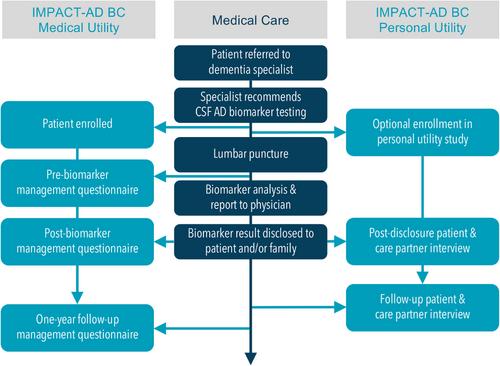Clinical value of Alzheimer's disease biomarker testing
Abstract
INTRODUCTION
In the Investigating the Impact of Alzheimer's Disease Diagnostics in British Columbia (IMPACT-AD BC) study, we aimed to understand how Alzheimer's disease (AD) cerebrospinal fluid (CSF) biomarker testing—used in medical care—impacted medical decision-making (medical utility), personal decision-making (personal utility), and health system economics.
METHODS
The study was designed as an observational, longitudinal cohort study. A total of 149 patients were enrolled between February 2019 and July 2021. Patients referred to memory clinics were approached to participate if their dementia specialist ordered AD CSF biomarker testing as part of their routine medical care, and the clinical scenario met the appropriate use criteria for lumbar puncture and AD CSF biomarker testing. For the medical utility pillar, detailed clinical management plans were collected via physician questionnaires pre- and post-biomarker disclosure.
RESULTS
Patients with completed management questionnaires (n = 142) had a median age of 64 (interquartile range: 59–69) years, 48% were female, and 60% had CSF biomarker profiles on the AD continuum. Clinical management changed in 89.4% of cases. AD biomarker testing was associated with decreased need for other diagnostic procedures, including brain imaging (–52.0%) and detailed neuropsychological assessments (–63.2%), increased referrals and counseling (57.0%), and guided AD-related drug prescriptions (+88.4% and –50.0% in biomarker-positive and -negative cases, respectively).
DISCUSSION
AD biomarker testing was associated with significant and positive changes in clinical management, including decreased health care resource use, therapy optimization, and increased patient and family member counseling. While certain changes in management were linked to the AD biomarker profile (e.g., referral to clinical trials), the majority of changes were independent of baseline clinical presentation and level of cognitive impairment, demonstrating a broad value for AD biomarker testing in individuals meeting the appropriate use criteria for testing.


 求助内容:
求助内容: 应助结果提醒方式:
应助结果提醒方式:


